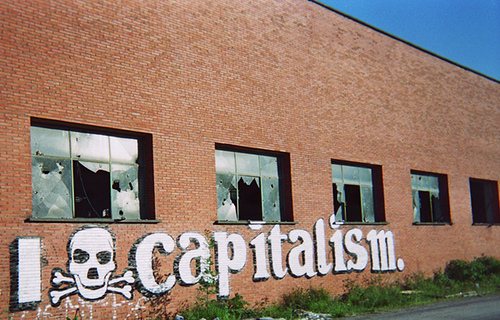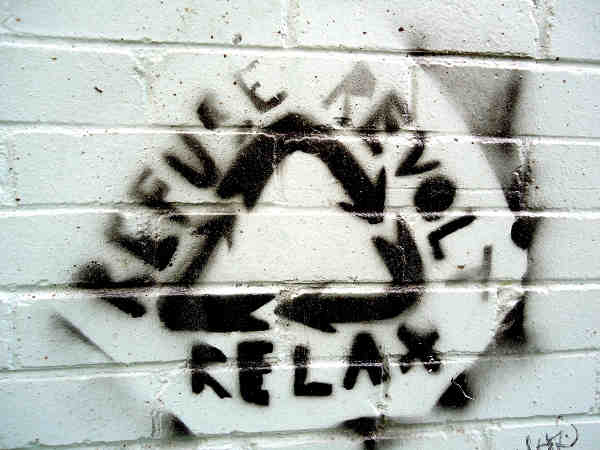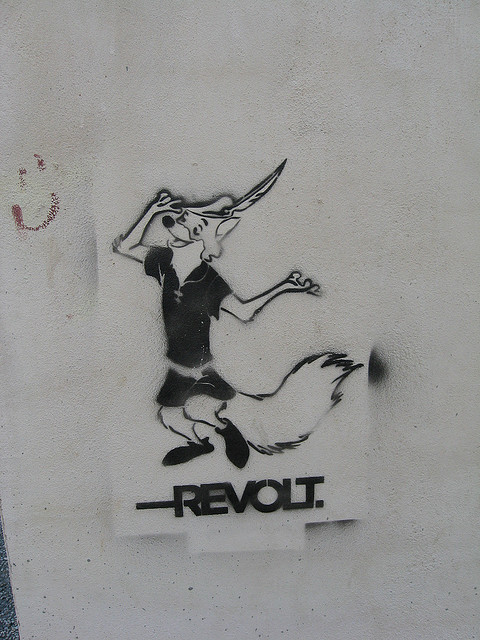|
|||||||||||||
|
Or is a Satisfying Life not Reachable Within Capitalism? By Punkerslut
The Terms of Your Labor
Everyone wants to feel useful and to be part of the greater social order. We value and cherish things according to the ideas we have taken from the people around us. The concept of any type of "right and wrong" has no context when we are not among others whom we can inflict "right" or "wrong" upon. Joys that come from creativity, from interaction, from art, from recognition and ambition, all of these would be impossible without our inherently social nature. And one of the most important parts determining the nature of your interaction with others is your job. But what about your job are you guaranteed from your society? A manufacturing job will mean routine activity without any much involvement of the person's individuality, just like service jobs will depend on subservience and a personality submissive to the customers. Physical labor means scars and cuts, dislocated bones that never quite pop back into place, and strained tendons that will burn and twist your entire life until you pass away on your deathbed. Office work will bury you in repetitive, meaningless activity that always leaves you feeling drained, and needing to replace the inner void with some type of irresponsible satisfaction. Every type of work, taken long enough every day and long enough over years, will mean something that destroys the person working. There are some things that are the same for all jobs. You need to respect and obey your boss, regardless of how you feel about your working conditions. The healthcare plan, if one is provided, will be as weak and undersupplied as possible. The terms of your work will require your hours, and not your efforts. You sell chunks of your life at piece-rate, not the act of becoming involved in the greater society. You're selling the your willingness to be obedient for that time, and to carry out whatever orders are given to you. Your working situation is the most important aspect of your social involvement, but you have no way to express it in a way that is healthy. The only option available is one that demeans you as an individual, makes you a meaningless part of some profiteering plan, and ignores all of your social needs. During a recession, people are more willing to hold on to worse jobs, because they already recognize the absence of other opportunities in the economy. But during the "upswing," the economy provides employment of the same quality. Either employment is in expansion, in which case employers are trying to get as much as they can during the season of plenty. Or, the employment is in contraction, in which case employers try to hold as much as they can, demanding as much as possible from workers while paying as little as possible. There was never so much hatred of work and labor as there is today. In Russian, a country where the common workers treasured the right to own land and be their own boss, we find this sentiment from the year 1892: "You must have seen a sunset when returning from work. You must have been a peasant among peasants to keep the splendor of it in your eye." [*1] But today, there is no splendor or glory, no satisfaction or pleasure, no right to be personally independent and self-sustaining -- you must put up with your conditions of work to get your wage, and you must depend upon whatever your wages can purchase to live.
The Destruction of Individuality Through Dependence
Why people suffer through economic subservience is well-known. There is no other opportunity to provide for your needs, except to put yourself under the guardianship of a business-owner. Or, as it is called today, to employ yourself. You have nowhere else to turn, except to an employer. There is no bread that can be purchased by independence, there is no home that you can buy with your individuality; that is, unless you are an employer. There is "competition" between employers to give better terms; but there is no competition against the system of employment and economic subservience. You can only be a part of the greater society, by submitting your individuality to the constraints of an employer. You can only interact, work and enjoy the products of others' work, by regimenting your interaction to what your boss demands. You can only have the time and energy to exchange your thoughts and emotions with others, according to hours and intensity of the work imposed upon you. Everyone's pleasures, from comfort to music to art to simple reminiscing of memories, involve recognizing the impulse of social interaction inherent in humanity. But, everyone's individuality and interaction must be tempered to the hot iron of Capitalist profits. You do not own the terms of your work. You do not have the right to dictate how intensely or lightly you will work, how your workplace will be organized, or when you begin or end your schedule. When you shall have the right to dream, that shall be in the hands of your superior. When you shall have the right to privately laugh, to feel peaceful among friends, to be the master of your own mind's passions, all of these are rights that come with owning society's productive property. And those who live by owning don't need to work. Instead, they simply manage. The right they claim for themselves, independence in economy, is a right they withhold from you. Society, then, becomes split. The crack runs between those who own the factories and the farms on one side, and those who built and work those factories and farms on the other side. The terms of your work are determined by your boss for a good reason: because it is in their own self-interest. The more you work, the more they will have to gain. The less you have for yourself, the less you're taking from company profits. Business efficiency must be achieved, no matter the physical or emotional damage that must come to those who accomplish it by their labor. The tools are owned by people who do not work them. Therefore, it is in the owner's interests to destroy the social impulse in the workers as much as possible, thus conditioning the individual to the terms of work. If you had your right to individuality, to express yourself and to work as much as you want, you wouldn't work eight-hours a day -- and you wouldn't need to. A single family in the year 1900 could produce enough food for a thousand, and they worked less than eight-hours per day. [*2] Consider the technology today and what it could provide for the small amount of labors we provide. There be plenty available for everyone, since it wasn't being hoarded by the few economic masters. And not only that, but the terms of your work could actually be chosen in a way that satisfies your interest to be part of the bigger society. Not only would your job serve the purpose of providing for you materially, but it might also provide the types of emotional satisfactions that every human being naturally craves.
What Alternatives Do You Have?
In the beginning of the trade union movement, the history of working-class resistance to modern Capitalism was yet to be written. The American Federation of Labor (AFL) supported programs like the Homestead Act, which allowed workers to claim land for themselves if it was unoccupied. [*3] Socialists like Robert Owen, on the other hand, tried to build model factory-communities, with ideal work and living conditions. [*4] There was once a time when people fantasized about escaping the industrial serfhood, by finding some place where they could be both a worker and an owner. But, today, there is no option for this within the confines of an economy dominated by owners. Even if you could find a piece of land, and keep it to yourself, you wouldn't be able to produce much on it without the necessary equipment. Without using it to produce and generate revenues, you'll slowly go into deeper and deeper debt from the back-taxes you owe to the state. And if you do have the technical advantage of tractors, automated irrigation, and harvest combines, you would not at all be able to make full use of them by your labor alone. As technology becomes more productive, it becomes more expensive -- fewer workers are needed for equipment that produces more and more. The possibility of each worker owning their own business or industry becomes so unlikely, that we have the situation of our modern: the vast majority of people are either workers or dependent upon workers. With the growth of technology, which cannot be stopped, this trend is becoming more fixed and regimented. The chances for breaking out of the confines of this imposing system are becoming less and less. Only those who possess industry have the right to regulate themselves and their activity as they think best satisfies their personal ambitions. The economic system of mastery is like that of any government dictatorship: either you are part of the privileged, who possess and exploit, or you are part of the underprivileged, who must be possessed and exploited. There is no middle-ground of self-sufficiency and equality -- you cannot satisfy your desire to fully develop yourself within society, unless you allow your conscience and moral senses to atrophy and become deformed. You cannot find the satisfaction of some great ambitious accomplishment, without consenting to the system that bends and weakens the individual's desire toward independence. This is the system of Capitalism, and in its most developed form today, it provides as few outlets for alternatives as possible. If individual mastery of the economy means degrading conditions for everyone, then there must be collective management of society. If it is impossible for each person to possess their own entire factory, then the only method for allowing the full achievement of personal ambition is through a social control of industry. There will be no other way for you to become an independent individual able to choose the terms of your interaction with the world. Any type of acceptance of Capitalism means accepting your position in it, either as the despised exploiter or the neglected exploited.
Punkerslut, Resources *1. "The Conquest of Bread," by Peter Kropotkin, with a preface by Kent Bromley, First Edition, G. P. Putnam's Sons, New York and London, 1906, chapter 9, part V.
|





